
Messe Frankfurt events recognised as top 250 US trade shows in 2016
A remarkable thing has happened in the four years since the first conference of Making it in Textiles has been held in Bradford.
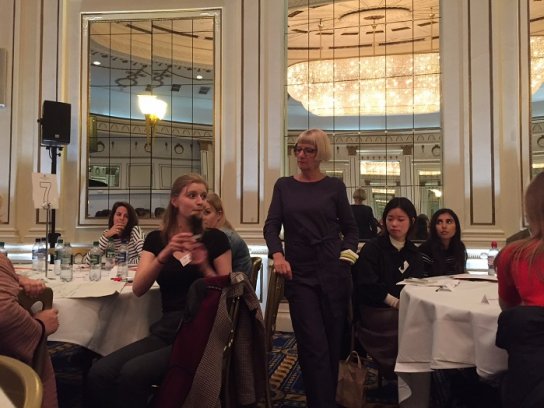
6th November 2017
Innovation in Textiles
|
Bradford
Janet Prescott reports
A remarkable thing has happened in the four years since the first conference of Making it in Textiles has been held in Bradford. MiT is now an important annual event and attracts well known textile manufacturing leaders, academics, press and entrepreneurs who are keen to spread the news to young designers that there is a growing need and place for their creative talents in the manufacturing process.
The two day conference, timed to coincide with Wool Week UK in October, involves selected student delegates from design departments of UK universities. Making it in Textiles started off when the various societies of Weavers, Dyers, Clothworkers and Finishers, together with leading lights of industry decided to use their prestige to open a door to textile design students. The idea was to shed light on the opportunities which were waiting in manufacturing, job routes which they might not have considered before.
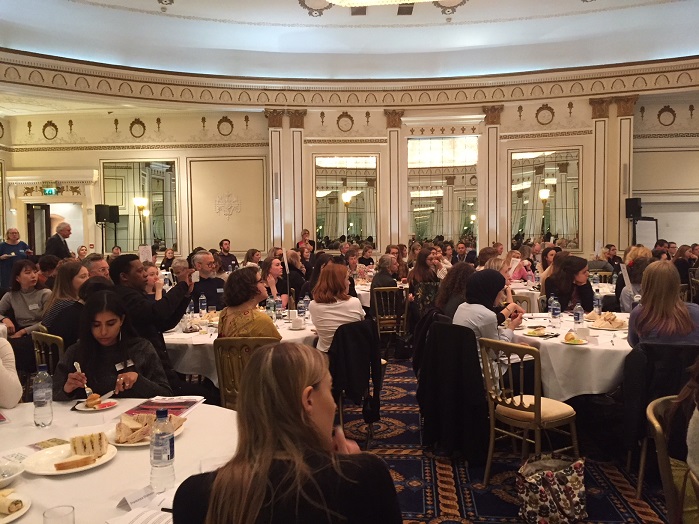
The pacy formula for the event is clear and it works. The best of textile design students in their final year of study at Universities around the country are selected by tutors to take part in the gathering at the famous Midland Hotel in Bradford, still an imposing building, redolent with textile industry history, the meeting place for the world of textiles for a hundred years and more.
Delegates are encouraged to mix and network, split up from their comfort groups by seating plans to mingle with students from other universities during the different stages. This has proved very successful.
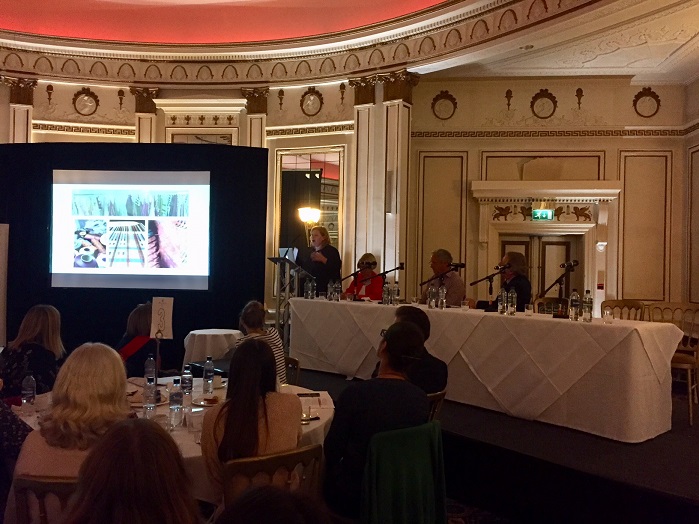
The event is comprised of entertaining talks and discussions packed with information and advice delivered during the first day, followed by a networking drinks reception and formal dinner for participants in the splendid dining room of the Midland. This year’s keynote after dinner speaker was Margaret Howell’s distinguished CEO, Richard Craig.
The day’s talks by industry leaders encouraged the young delegates to keep their minds and options open to opportunities in manufacturing, by a mixture of information and entertaining scenarios. Delegates heard how former textile design students have gone into a wide area of design and creative areas: interiors, car design, selecting materials, some starting their own businesses, working in factories with state of the art machinery and IT, finding the creative areas in the most industrialised of processes, influencing design and trends and putting their knowledge to work.
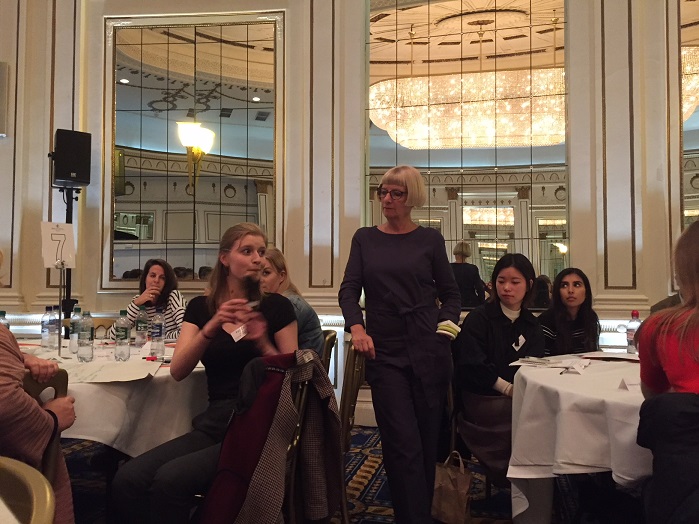
Sheila-Mary Carruthers, the lively and charismatic Scottish Textiles Consultant and academic, exhorted students to take on new challenges, even if they were not the ones they had immediately envisaged, citing her own career in weaving, knitwear and fashion where she took on unlikely challenges which shaped her success. Sheila-Mary later chaired a session interviewing young textile alumni. (Andrew Stevenson of Paul Smith, Cheryl Kindness who has moved from board level textile work to exploring her own art with a new business, Mary Penny, designer at Johnstons of Elgin, Katie Fairfull of Transcal, designing fabrics for the automotive areas, Beth Hey, designing at Joshua Ellis and Hanna Auerbach-George of Warner Textile Archive)
The second day of the conference is taken up with an early start and an exodus in coaches to tour in select groups round the specialist mills and factories in the Yorkshire area. This year each group visited two mills, enabling a good range of processes and businesses to be experienced.
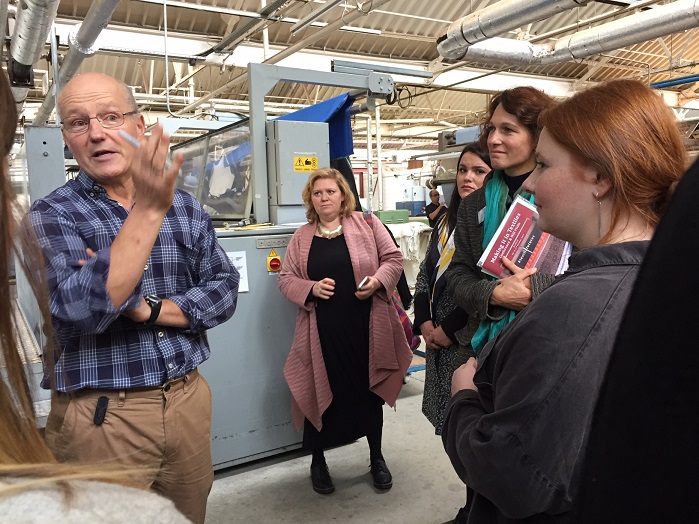
This practical experience is the eye-opener for most young designers, an opportunity to see in action the mix of traditional skills and state of the art kit which have automated processes out of all recognition, retaining vital parts of the craft process.
Directors and high-level production and marketing personnel generously make themselves available on the visits. It’s an exclusive insight into how things work on an industrial scale; the fascination in seeing the way a warp is set up, the speed and accuracy of machines, how dyestuffs are changing with technology and demands of a more ecological approach and the alchemy of transformation by finishing of a piece of fabric in many different ways.
This year's participating mills were Pennine Weavers, Stanley Mills, Marton Mills, Roberts Dyers and finishers, Antich& Sons, AW Hainsworth, Alfred Brown, Abraham Moon and Laxtons Specialist Yarns.
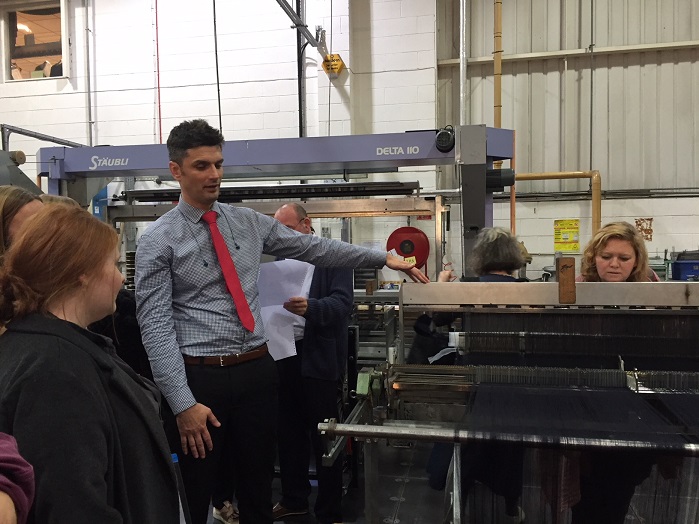
Delegates were from universities from the North of Scotland to Cornwall in the South West, from South Wales to London: Bath Spa University, Birmingham City University; Central St Martins, London University, Chelsea College of Art; Coleg Sir Gar in Carmarthenshire, South Wales; De Montfort University; Derby University; Falmouth University; Hereford College of Art, Heriot Watt University Scotland, Loughborough University, Manchester Metropolitan University, Middlesex University, Nottingham Trent University, Royal College of Art, Glasgow School of Art, UCA Farnham, University of Brighton, University of Huddersfield University of Leeds, Winchester School of Art,,
Each year, report the MiT organisers, the students arrive better briefed on the industry, building on the experiences of delegates in previous years, with a much more discernible interest in the various paths which can be taken to exploit their talents and interests. Enthusiasm seems to be a great feature of the experience. Angela Swan Greaves, a founder member, commented: "this being the fourth year of the conference, we are getting very positive feedback from the industry, showing that newly graduated designers who have attended, are more employable and have a better understanding of job opportunities and what is expected of them in work. Feedback from students is very positive." Both weave and several knit designers attended in 2017, perhaps indicating an even wider appeal.
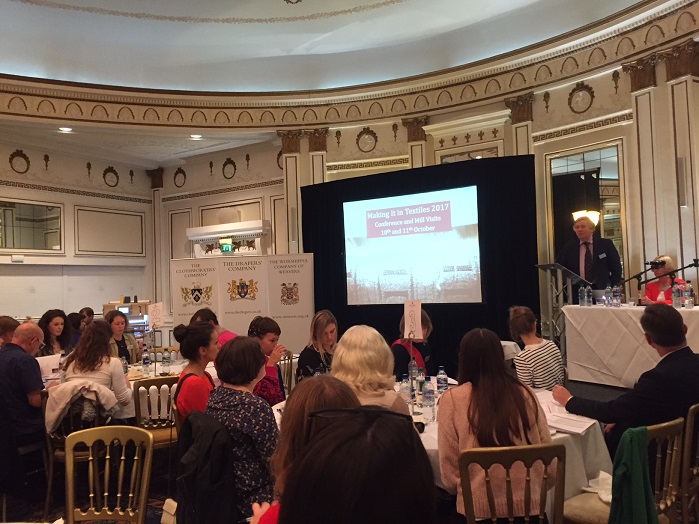
Making it in Textiles is only made possible by the support from the Campaign for Wool, and Wool Week The Clothworkers' Company, The Drapers' Company and the Weavers’ Company, Guilds founded in the Middle ages. James Sugden, of the Weavers Company, personally involved in driving the concept from the start said in his foreword to the conference; “the idea came from feedback from tutors who said that students no longer had the opportunity to learn first-hand about the industry by talking to manufacturers and seeing industrial production. There is a skills gap in the textiles industry, now resurgent and creating jobs” adding “there is a finite number of pure design roles available, but textile companies need young people with a range of skills interested in building on their design skills in roles like supply chain management, yarn sourcing, quality control and production management”.
Making it in Textiles can be a real example of how the past can influence the present and shape the future.
Speakers list:
The keynote address was by Richard Craig, CEO Margaret, Howell Ltd, with an international career in textile and luxury goods, a long career with Margaret Howell. His quoted ‘particular interest in UK manufacturing and working with Europe’ summing up the thrust of the conference.

Business intelligence for the fibre, textiles and apparel industries: technologies, innovations, markets, investments, trade policy, sourcing, strategy...
Find out more